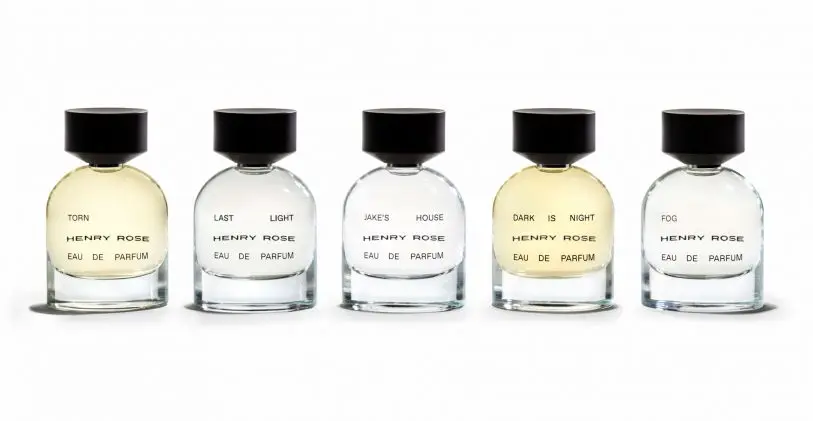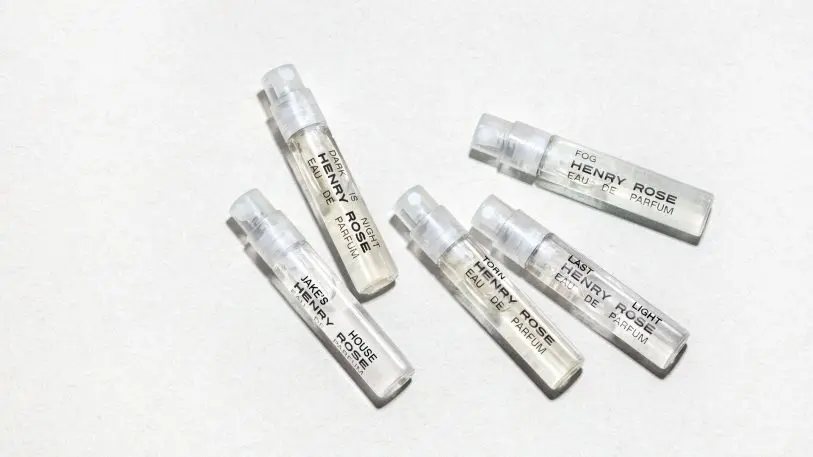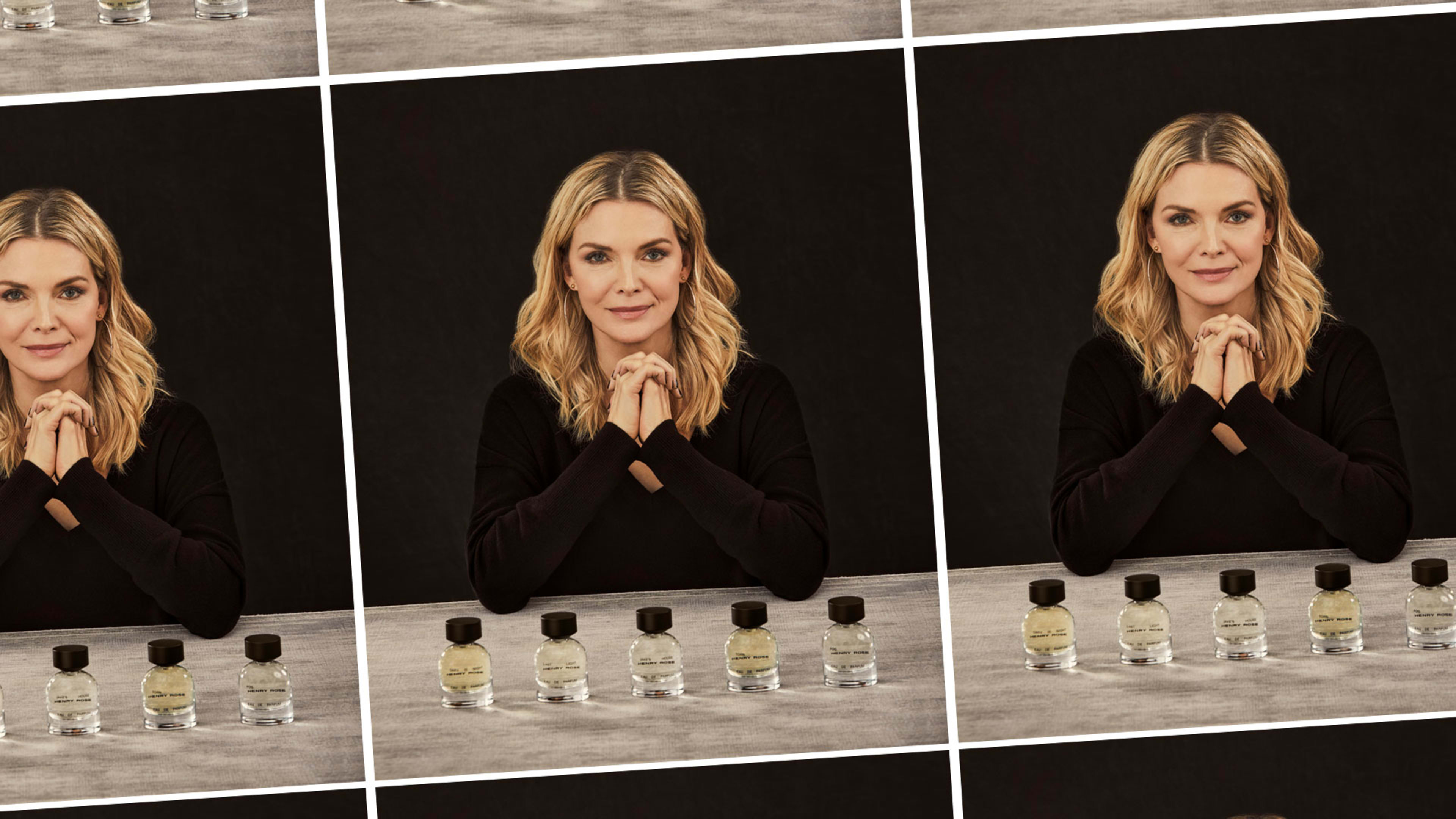While safer cosmetics have transformed the beauty industry, “the world of fine fragrance is still a black box,” says actress Michelle Pfeiffer, who is launching a new direct-to-consumer perfume company, Henry Rose, to bring unprecedented transparency to a traditionally cryptic industry.
In a first for an upscale perfumery, Henry Rose offers customers the full ingredient list for each of its inaugural five scents, which include the bright and festive Jake’s House, the sultry Dark Is the Night, and the spicy, earthy Torn (“the closest I could come to Old Spice,” says Pfeiffer). Even more impressive: Every ingredient has been certified as safe and environmentally sound by the nonprofit watchdogs Cradle to Cradle and the Environmental Working Group, where Pfeiffer serves as a board member. “Customers are looking for guidance on what’s safer and healthier,” says Pfeiffer. “But [perfume companies] can’t help them until we know what’s actually in our fragrances.”
In keeping with the brand’s ethos, the $120 scents come in 1.7-ounce bottles made of 90% recycled glass with soy-based caps, and are shipped in biobased, biodegradable packaging. (Pfeiffer says she is holding off on creating smaller, travel-sized bottles until she can find environmentally responsible containers.)
Henry Rose’s launch was more than a decade in the making. Pfeiffer first started speaking with cosmetic companies about creating a scent that was free of parabens, phthalates, and other known harmful ingredients around 2010. At the time, no one was interested. Today, companies both small and large see value in creating safer beauty products. (Just witness the supporters of the proposed Personal Care Products Safety Act bill, cosponsored by Senators Dianne Feinstein and Susan Collins of Maine, which include L’Oréal, Johnson & Johnson, Beautycounter, and others.) But Pfeiffer’s brand is the rare fine fragrance company that’s voluntarily committing to higher standards, and paving the way for other perfumers to follow.
She spoke with Fast Company about her entrepreneurial journey, the value of transparency, and why Henry Rose is decidedly not a celebrity perfume.
Fast Company: How do you describe Henry Rose? Is this a “natural” fragrance company?
Michelle Pfeiffer: There’s been so much misleading language and false promises in the personal care space. What does “natural” mean? Anything you want it to, really. Same with clean or organic. So Henry Rose is not about what’s the most natural, clean, or organic. It’s about what’s the most safe.

MP: Back in the day when people used to smoke on airplanes and on sets, I lived off of a six-pack of Coca-Cola and three packs of Marlboros a day. I quit smoking before I had kids, of course. And when I became a mom [about 20 years ago], I started to look at the world through the eyes of my children. I started to read labels. I stumbled on the Environmental Working Group’s Skin Deep Cosmetics Database, where you can look up the ingredients of products you are using and search out safer options. Often I would find promising products, but when I looked up what was in their fragrance, the EWG hazard level would shoot up. So I stopped wearing perfume. But I started to miss it, and to question whether it was possible to create something [safer] that I loved—that was similar to the premium, fine fragrances that I used to wear.
FC: Did you consider signing a licensing deal with a cosmetics company, as many celebrities do when they’re creating a scent?
MP: I explored the possibility of working with a cosmetics company [around 2010]. But that proved a dead end. In meetings, I would mention things like parabens and phthalates, and ask if we could only use trustworthy ingredients. I got nowhere. Nobody was interested in doing this kind of product with me. [Eventually] I found [the leading perfume company] International Flavors & Fragrances, which had already been working on a product that could meet the Cradle to Cradle certification. So they understood what I wanted, what I was trying to do. They knew that we would have to [study] everything that’s in the fragrance. I felt confident that I had landed in the right place. So I set out to create one fragrance, and ended up with a company that has five of them.
FC: What was it like to create scents that are both EWG-verified and Cradle to Cradle-certified?
MP: Perfumers typically choose from a palette of 3,000 ingredients. We ended up having to whittle it down to about 250. What was unexpected and exhilarating was the communication that happened between EWG, Cradle to Cradle, and [the chemists at] IFF. No one had ever tried to develop a fragrance to meet these standards and achieve the level of quality we were looking for. We had so many discussions about what ingredients we could use. If any one of [these groups] had gotten out of shape and thought it was just too much trouble, we would have failed. Instead, they’ve all learned from the process. Now, all these ingredients are in their databases.

MP: The fragrance industry has been hidden behind trade secrets. But the truth is, even if you know all the ingredients in a fragrance, duplicating it is challenging, because you don’t know the concentrations. And I think it’s important to move the needle toward transparency within the industry.
FC: As a private person who has famously let her film work speak for itself, how do you feel about being the public face of a company?
MP: I’m now on Instagram. It’s been scary, though not nearly as much as I thought it would be. You can become obsessed with it. I’m not sure how healthy it is, but I’m having more fun with it than I expected. But my name and image aren’t on Henry Rose’s packaging. From the beginning, we realized how hard it would be for this company to stand on its own. I will be the face for Henry Rose for as long and as much as I need to. I can get some initial attention and help to build a successful launch. But if the brand is going to have legs and succeed, it has to be about more than me.
Recognize your company's culture of innovation by applying to this year's Best Workplaces for Innovators Awards before the extended deadline, April 12.
